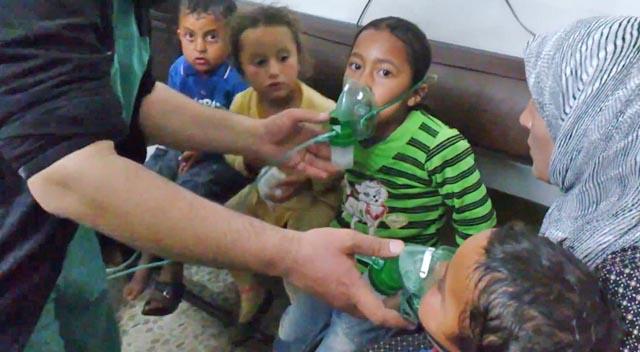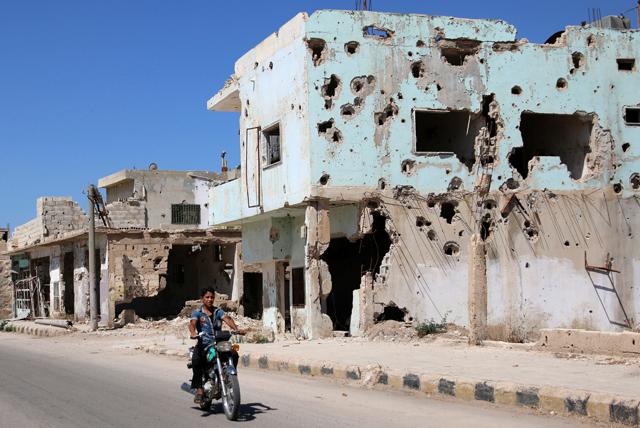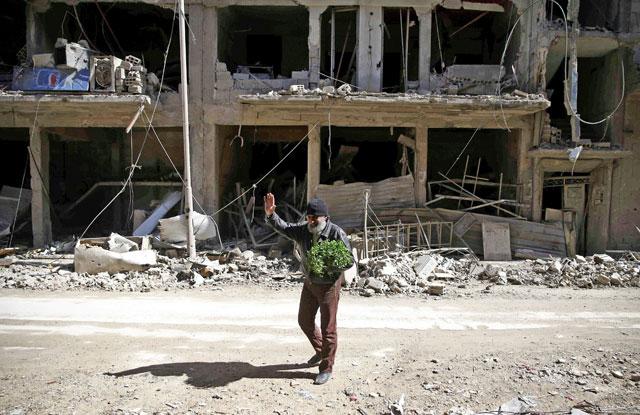You are here
Chemical weapons watchdog weighs chlorine attack probe in Syria — sources
By Reuters - Apr 24,2014 - Last updated at Apr 24,2014

AMSTERDAM — The head of the global chemical weapons watchdog overseeing the destruction of Syria’s toxic stockpile is considering launching a fact-finding mission on his own initiative to investigate reports of chlorine gas attacks there, sources said.
Syria became a member of the Organisation for the Prohibition of Chemical Weapons (OPCW) last year as part of a deal with Russia and the United States to destroy its chemical weapons programme.
OPCW head Ahmet Uzumcu has the authority to launch an investigation into alleged use of chemical weapons in member states, including Syria, without the need to seek a formal request from a member state, sources told Reuters on Thursday.
“The OPCW director general is considering, on his own initiative, sending a fact-finding mission,” one source said.
“A number of questions are still to be answered: Syrian consent, mandate of the mission, participants from other organisations, such as the World Health Organisation,” the source said.
OPCW spokesman Michael Luhan declined to comment.
Several of Washington’s key European allies, including Germany and France, support an investigation into the latest claims of chlorine gas use, the sources said.
“The indications of the use of chlorine on 11-13 April in Hama province are particularly concerning,” a British official said on Thursday.
“We think there needs to be an investigation of recent reports of the use of chemical weapons including chlorine and we are working with others in the international community to establish how that should be done.”
Syria has vowed to hand over or destroy its entire arsenal by the end of this week. It still has roughly 7.5 per cent of the chemicals it declared to the OPCW and has not yet destroyed all of a dozen production and storage facilities.
Cooperation from Syria and other international organisations would need to be arranged to provide security because of the country’s ongoing civil war, which has left 130,000 dead and forced millions more from their homes.
‘What are we
good for?’
Washington and its Western allies have blamed President Bashar Assad’s forces for using sarin gas in an attack in August that killed hundreds of people in the outskirts of Damascus. Assad has blamed the rebels.
A UN-led inquiry found that chemical weapons were likely used in five attacks in 2013, although it did not apportion blame. The nerve agent sarin was probably used in four of the five attacks, it found.
Chlorine, which was first used as a weapon in World War I, is believed to have been used in attacks in several areas of Syria this month.
All the attacks shared the same characteristics, leading analysts to believe they are part of a coordinated campaign, in which barrels of the toxic chemical have been dropped from helicopters.
Rebels have posted photos and video footage they claim show the latest attacks are also the work of forces under Assad.
“The convention forbids the use of toxic chemicals in warfare,” another source at the OPCW said. “If we close our eyes to any alleged use, we should be asking ourselves: What are we good for?”
French Foreign Minister Laurent Fabius backed calls for an investigation.
“We are gathering precise elements, and if we find them then clearly several steps will have to be taken at the United Nations and the OPCW,” he told reporters.
“The use of such chemicals would be criminal and contrary to all commitments of countries concerned.”
Baseless allegations
Syria’s Deputy Foreign Minister Faisal Meqdad said the charges against Syrian government forces were intended “to overshadow the achievements made by Syria” in ending its chemical weapons programme.
As part of the agreement that averted US military strikes last year, Damascus has until June 30 to destroy all chemical weapons, and their production and storage facilities.
Meqdad “refuted as baseless the allegation made by the US, France and Israel on using toxic materials by the Syrian Arab army in any of the Syrian territories”, a statement said.
Syria’s remaining stockpile of declared chemical weapons are in more than a dozen lorry containers, in a location near Damascus that the government has said was unreachable due to fighting.
The OPCW enforces adherence to the Chemical Weapons Convention, which requires members to declare all chemical stocks to the organisation, which won the Nobel Peace prize last year.
On Thursday, the joint UN-OPCW mission to Syria said the total of chemical material removed and destroyed in country had reached 92.5 per cent of the 1,300 metric tonnes Damascus reported.
“I welcome the significant progress of the last three weeks, and I strongly encourage the Syrian authorities to conclude the removal operations as part of their efforts to achieve the 30 June, 2014, deadline,” mission chief Sigrid Kaag said.
Syria has not declared either the sarin, munitions used in last year’s attack, or chlorine, officials said. If it had them, they should be reported to the OPCW.
US State Department spokeswoman Jen Psaki said on Monday that Washington had indications that chlorine was probably used by government forces in Syria and said an investigation was needed.
Even if Syria meets the June 30 deadline and abandons its decades-old chemical weapons programme, the OPCW’s work there will not be finished, one diplomat said.
“If anyone pats themselves on the back and says this is over, they will be fooling themselves.”
Related Articles
BEIRUT — The Syrian government has denied a UN report accusing it of a sarin attack in April that killed scores of people, state media said
THE HAGUE — A preliminary report by the world’s chemical weapons watchdog said “various chlorinated chemicals” were found at the site of an
AMSTERDAM — The world's chemical weapons watchdog opened an investigation on Sunday into attacks in the besieged, rebel-held Syrian region o

















